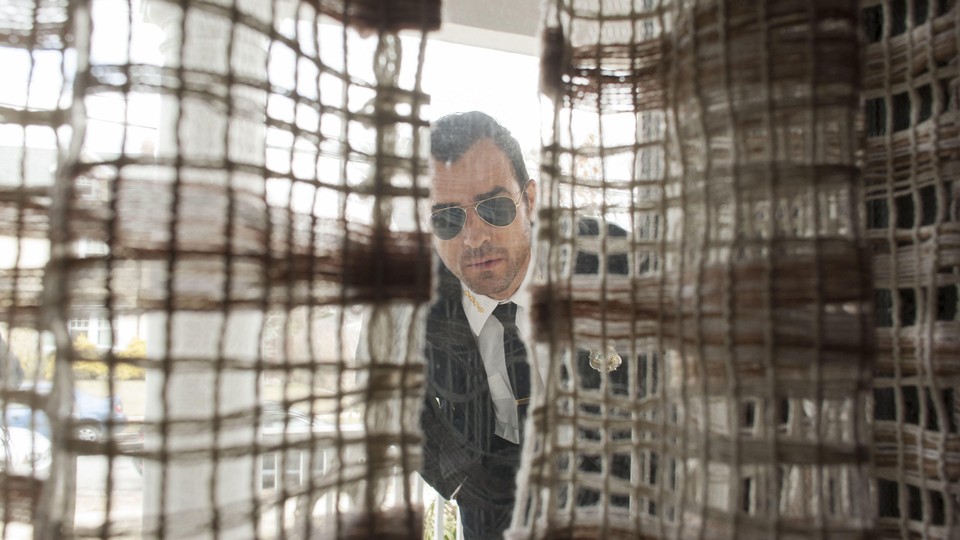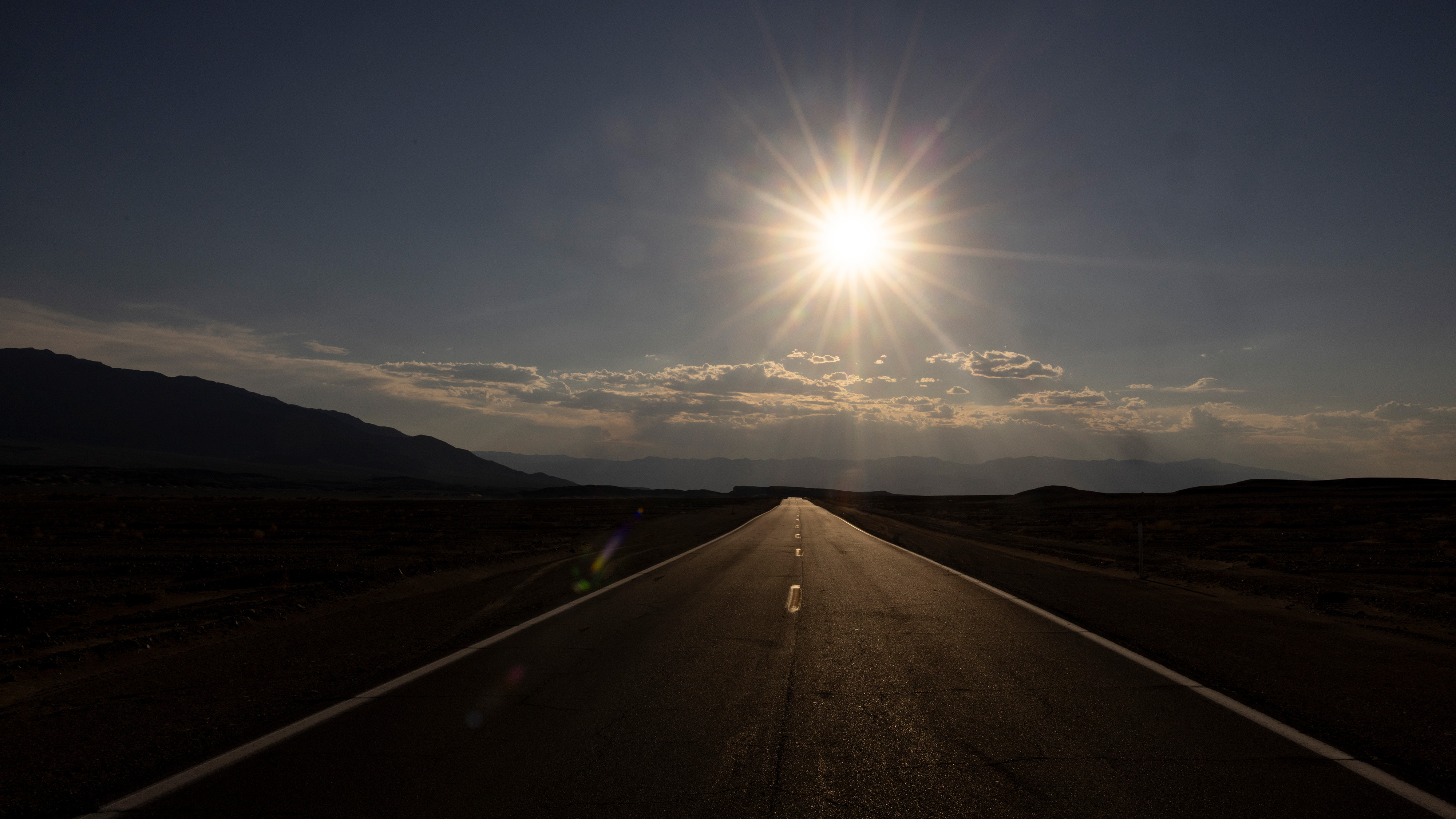A Deeply Weird, Immersive TV Show
7 min read
This is an edition of The Atlantic Daily, a newsletter that guides you through the biggest stories of the day, helps you discover new ideas, and recommends the best in culture. Sign up for it here.
Welcome back to The Daily’s Sunday culture edition, in which one Atlantic writer or editor reveals what’s keeping them entertained. Today’s special guest is Janice Wolly, The Atlantic’s copy chief.
Janice is looking to talk with somebody who also watched the 2014 show The Leftovers, “a deeply weird, immersive” series about what happens when 2 percent of the world’s population disappears. She’s also a big fan of the singer Brandi Carlile, who writes soft ballads that swell into powerhouses, and the whimsical children’s podcast Melon’s House Party.
First, here are three Sunday reads from The Atlantic:
- Trump is planning for a landslide win.
- The sad future of grocery shopping
- The new age of endless parenting
The Culture Survey: Janice Wolly
The upcoming event I’m most looking forward to: After Wimbledon and the Olympics comes the U.S. Open—amazing tennis, in my time zone! In the women’s tournament, I am invested in America’s Coco Gauff. On the men’s side, it’s well past time to say goodbye to Novak Djokovic, so I’m planning to root for the likes of Carlos Alcaraz and Alexander Zverev, as well as the Americans Frances Tiafoe and Ben Shelton. I’m especially eager to see thrilling matches between these dynamic young players, regardless of who wins. [Related: The unbearable greatness of Djokovic]
The television show I’m most enjoying right now: I recently finished The Leftovers, but I’m still ruminating about it. The show, about the people left behind after the “Sudden Departure” of 2 percent of the world’s population, is a deeply weird, immersive experience that made me ponder death and love and loss and belief. It was also a terrible treadmill watch, as I call shows that don’t require much brainpower but do hook me enough that I keep exercising in order to watch them (think: Love Is Blind and anything else in what a colleague coined “the Nick Lachey Cinematic Universe”).
The Leftovers was too intellectual, too surprising, too gripping to be confined to morning treadmill time, and I found myself binge-watching episodes (while prone on my couch, burning zero calories) until I completed the final season. I of course did this years after the show originally aired, and I would love to find someone who watched it then so we can delve into how differently the show must read post-pandemic than it did back in 2014.
Something I recently rewatched: Speaking of something that hits differently in 2024 than it did in 2014, let’s talk about Obvious Child, a quiet, tender, funny movie about abortion starring Jenny Slate. So many unintended pregnancies on-screen lead to the less controversial decision to have the baby, but this film’s protagonist, Donna, quickly schedules an abortion and does not waver. Rewatching the movie post-Dobbs, I thought about the devastating number of women now facing insurmountable obstacles to reproductive health care. Obvious Child also rang differently for me now because I’ve ended a pregnancy of my own since first seeing it, although I have basically nothing in common with Donna or her situation. I wish I’d been able to have her frank, brave perspective the night before the procedure: “I think it’s gonna be okay. And afterwards I’ll just be in my future, and, you know, we’ll go from there.”
An author I will read anything by: I’m guilty of ignoring a pretty severe New Yorker pileup on my nightstand, but I always make a beeline for articles by Rachel Aviv, Sarah Stillman, Kathryn Schulz, Ben Taub, and good ol’ John McPhee.
A quiet song that I love, and a loud song that I love: Practically any song by Brandi Carlile qualifies as both. I somehow only discovered Carlile when she performed at the 2023 Grammys. I love the sneakiness of her songs—soft ballads that swell into dynamic waves and engulf you.
Take her performance of “When You’re Wrong” during her HBO concert special, In the Canyon Haze. Despite my Spotify deep dives, I had never heard this song. It starts out with some quiet regret about an aging family member (“Your eyes are not as bright as I remember them to be”), then all of a sudden she’s accusing this person of “lay[ing] down every night next to a goddamn liar.” I sat up ramrod straight when I first heard it. Amid the beautiful harmonies and SistaStrings’ gorgeous contributions, the lyrics (by Carlile’s musical partners Tim and Phil Hanseroth) are starkly in-your-face: “It’s a long way to be sinkin’ holdin’ tightly to the weights / of the one who pulls you down while you slowly waste your days.” Perhaps you, like me, wish you could speak this bluntly to someone. What I really want to know is: Will they listen?
A cultural product I loved as a teenager and still love, and something I loved but now dislike: The soundtrack to my later high-school years was Guster’s Lost and Gone Forever. I have such a clear image of myself driving, CD player blasting, to downtown Philly for an unpaid internship that graduating students did once senioritis set in—this was my first real taste of independence besides summer camp and teen tours. I still remember my (very much unrequited) senior-year crush, and friends putting lyrics in their AIM profile, and that particular stretch of I-95. And I still love that album.
As for something I loved but now dislike … lawn concerts, for Guster or anyone else. I require a proper seat and fewer mosquitoes, thank you. To the lawn I say, “So long, and I won’t be back soon.” Do I get two points for honesty?
A favorite story I’ve read in The Atlantic: One of the best parts of my job is the chance to appreciate master wordsmiths up close—I actually love having an edit rejected because the original phrasing has some sort of subtle poetry I didn’t pick up on at first. A perfect example is my former colleague Tim Lavin’s 2010 article “The Listener,” a profile of the overnight radio host George Noory. I knew nothing about “paranormal media” and had never heard of Noory, who was “amiable in the face of dark machinations,” as Lavin says in typically evocative fashion. Read it now and you’ll see the precursor to today’s damagingly conspiratorial landscape, where Noory and guests (including a certain Alex Jones) were “endowing the most mundane of everyday events with numinous possibility.” [Related: The conspiracy theorists are winning.]
Something delightful introduced to me by a kid in my life: Melon’s House Party is a whimsical podcast for children, full of canine antics, heartfelt life lessons, and legitimately catchy songs. (I’m surprised every time by the genius lyrics and killer voices.) Here’s the summary my 6-year-old offered: “A tiny dog named Melon and she can talk. And her best friend is Couch.” She’s missing the important detail that Melon, Couch, and all of their friends—Grandmother Clock, Rita Records, Soulless Computer, Wall Calendar and her sidekick, Thumb Tack—talk to one another when humans aren’t around. They also go on wild adventures (Couch is surprisingly mobile). Throw in visitors including an “extremely cursed doll” and you have a hit, even though Melon sadly ended a few years ago, after two seasons. Now that my kiddo can read, I think we may need to embark on a letter-writing campaign to bring the show back.
The Week Ahead
- Twisters, a disaster film starring Glen Powell and Daisy Edgar-Jones about a group of storm chasers who must survive a brutal tornado season in Oklahoma (in theaters Friday)
- Lady in the Lake, a drama miniseries starring Natalie Portman as a housewife who becomes a reporter and investigates the potential link between the murders of a Black bartender and a young Jewish girl (premieres Friday on Apple TV+)
- The Lucky Ones, a memoir by Zara Chowdhary about her life after surviving anti-Muslim violence in India (out Tuesday)
Essay

I Went to Death Valley to Experience 129 Degrees
By Ross Andersen
A large digital thermometer sits at the entrance to the gleaming mid-century-modern visitor center in Furnace Creek, California. When I arrived on Sunday afternoon, it was thronged with people with their phones out, taking pictures. A mood of anticipation hummed through the crowd. A few hours east of us, in Las Vegas, temperatures would rise to 120 degrees Fahrenheit, smashing that city’s record by three degrees. But news reports suggested that here in the heart of Death Valley National Park, the high could reach 130, matching the hottest-ever day reliably measured on Earth.
Read the full article.
More in Culture
- Zach Bryan’s message to men
- Yes, Longlegs is that scary.
- Why that House of the Dragon death matters
- If the moon landing were a romantic comedy
- The liminal life of the expat
- What gardens of the future should look like
- Why The Bear is so hard to watch
- Eight books that will change your perspective
Catch Up on The Atlantic
- David Frum: Biden’s heartbreaking press conference
- The Trump national convention
- Is Kamala Harris ready for Trump?
Photo Album

Check out photos from the past week of a stegosaurus fossil up for auction in New York, a polar bear during a heat wave at the Prague Zoo, and a lightsaber-training session in Mexico City.
Explore all of our newsletters.
When you buy a book using a link in this newsletter, we receive a commission. Thank you for supporting The Atlantic.



